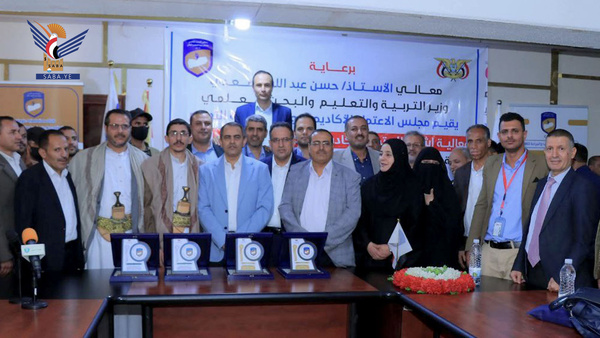
Sana'a – Saba:
The Academic Accreditation and Quality Assurance Council awarded on Sunday the National Programmatic Accreditation Certificate to September 21 University for Medical and Applied Sciences for its programs in Medical Administration, Laboratory Medicine, Advanced Nursing, and Clinical Pharmacy.
Minister of Education and Scientific Research, Hassan Al-Saadi, congratulated the university on achieving national academic accreditation for these programs. He praised the efforts of the university’s leadership and staff in overcoming challenges and working as a unified team to advance development and modernization.
Al-Saadi commended the role of the Academic Accreditation Council in guiding universities toward national programmatic accreditation as a step toward international recognition. He emphasized the importance of leveraging academic expertise to ensure qualified graduates meet labor market demands.
During the event, attended by Abdulmajeed Al-Houthi, Head of the General Authority for Endowments, Dr. Ahmed Al-Haboub, Chairman of the Academic Accreditation Council, highlighted the significance of medical education and its growing importance with improved quality. He noted that September 21 University recognized the vital link between these medical disciplines and societal needs, aligning its programs with accreditation standards from inception.
Dr. Al-Haboub stated that programmatic accreditation is a national achievement and strategic priority, paving the way for global recognition. He emphasized the university’s rapid progress in establishing its competitive edge in Yemen’s academic landscape.
He also stressed that accreditation has spurred unprecedented momentum in academia, calling for continued efforts. The university will undergo regular evaluations to maintain its high academic standing.
Dr. Abdulaziz Al-Shaibani, Vice Chairman of the Council, and Dr. Mohammed Dhiyafallah, Secretary-General, reviewed the accreditation decisions and the evaluation process, highlighting the joint efforts of assessment committees and university experts in meeting accreditation requirements.
Dr. Mujahid Ma’sar, President of September 21 University, acknowledged the support of the Ministry and the Council in guiding the university toward this milestone. He outlined the challenges faced during critical phases and the government’s role in resolving them.
Dr. Ma’sar noted that the university is a leader in medical education in Yemen and is working to complete requirements for accrediting its Medicine and Surgery program in the coming weeks.
He praised the efforts of the Council and the university’s faculty and staff in preparing for accreditation, considering the achievement a source of pride and motivation for other universities to seek accreditation.
During the event, attended by Council members and university officials, Dr. Huda Al-Sanahani, Director of Accreditation and Licensing, outlined the 33-step accreditation process, including technical support, self-assessment, external review, field visits, and final decision-making.
In conclusion, the Council awarded gold-level full accreditation for seven years to Medical Administration and Laboratory Medicine programs and silver-level conditional accreditation for four years to Advanced Nursing and Clinical Pharmacy. University officials received the accreditation certificates and shields.
The Academic Accreditation and Quality Assurance Council awarded on Sunday the National Programmatic Accreditation Certificate to September 21 University for Medical and Applied Sciences for its programs in Medical Administration, Laboratory Medicine, Advanced Nursing, and Clinical Pharmacy.
Minister of Education and Scientific Research, Hassan Al-Saadi, congratulated the university on achieving national academic accreditation for these programs. He praised the efforts of the university’s leadership and staff in overcoming challenges and working as a unified team to advance development and modernization.
Al-Saadi commended the role of the Academic Accreditation Council in guiding universities toward national programmatic accreditation as a step toward international recognition. He emphasized the importance of leveraging academic expertise to ensure qualified graduates meet labor market demands.
During the event, attended by Abdulmajeed Al-Houthi, Head of the General Authority for Endowments, Dr. Ahmed Al-Haboub, Chairman of the Academic Accreditation Council, highlighted the significance of medical education and its growing importance with improved quality. He noted that September 21 University recognized the vital link between these medical disciplines and societal needs, aligning its programs with accreditation standards from inception.
Dr. Al-Haboub stated that programmatic accreditation is a national achievement and strategic priority, paving the way for global recognition. He emphasized the university’s rapid progress in establishing its competitive edge in Yemen’s academic landscape.
He also stressed that accreditation has spurred unprecedented momentum in academia, calling for continued efforts. The university will undergo regular evaluations to maintain its high academic standing.
Dr. Abdulaziz Al-Shaibani, Vice Chairman of the Council, and Dr. Mohammed Dhiyafallah, Secretary-General, reviewed the accreditation decisions and the evaluation process, highlighting the joint efforts of assessment committees and university experts in meeting accreditation requirements.
Dr. Mujahid Ma’sar, President of September 21 University, acknowledged the support of the Ministry and the Council in guiding the university toward this milestone. He outlined the challenges faced during critical phases and the government’s role in resolving them.
Dr. Ma’sar noted that the university is a leader in medical education in Yemen and is working to complete requirements for accrediting its Medicine and Surgery program in the coming weeks.
He praised the efforts of the Council and the university’s faculty and staff in preparing for accreditation, considering the achievement a source of pride and motivation for other universities to seek accreditation.
During the event, attended by Council members and university officials, Dr. Huda Al-Sanahani, Director of Accreditation and Licensing, outlined the 33-step accreditation process, including technical support, self-assessment, external review, field visits, and final decision-making.
In conclusion, the Council awarded gold-level full accreditation for seven years to Medical Administration and Laboratory Medicine programs and silver-level conditional accreditation for four years to Advanced Nursing and Clinical Pharmacy. University officials received the accreditation certificates and shields.